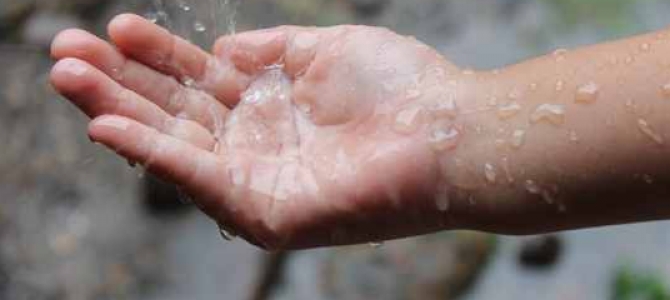 Shopping Cart
Shopping Cart
06 December 2022
Is rainwater hard or soft?

No matter where you are in the world, the water always tastes different from the tap to what you are used to. This change in “flavour” or “taste” can be attributed to the “hardness” of water, and this differs from region to region, state to state and country to country.
Hard water is water that contains dissolved minerals. Minerals are the materials that make up rocks, hence why it is called hard water. When water contains less of these dissolved minerals, it is known as soft water.
In most countries, no matter whether your water is hard or soft, it is typically safe to drink, especially in developed countries like New Zealand, Australia, the USA and the UK.
Is rainwater hard or soft?
As you might imagine, rainwater is naturally soft. It is usually slightly acidic due to the dissolved carbon dioxide gas from the atmosphere as it falls, however, if you collect rainwater in a tank as it falls onto your roof, this will typically be much softer than the mains water that comes out of the tap.
The reason for this is as rainwater falls on the ground, it flows slowly through the soil and rocks beneath. Carbonic acid in the rainwater then dissolves soluble minerals in the rocks and increases the hardness of the water. The solubility of the minerals determines how much is absorbed into the water, with some minerals being less soluble and having little impact on the hardness of the water.
Which minerals help to make water hard?
The most common minerals that are dissolved as part of this process are calcium carbonate and magnesium carbonate.
Calcium is extremely soluble and is found in animal shells as well as some rocks which have been formed from the fossils of ancient animals. In areas where this type of rock is prevalent, the water will typically be much harder than in other regions or even countries.
If you have ever noticed a build-up of a white chalky material on your kettle, calcium carbonate is the reason. Calcium carbonate is less soluble in hot water and becomes solid again to form limescale in your kettle as well as other machines such as a coffee machine. This thankfully is called “temporary hardness” as it can easily be removed. More permanent hardness is caused by minerals including calcium sulphate. This cannot be removed by heating and requires some sort of softening agent to prevent build-up that can lead to issues with blocked pipes, or damage to heating systems.
What is the hardness of rainwater?
Essentially, rainwater is the softest water as it has not yet had the opportunity to pass through any rocks and absorb any soluble minerals. Rainwater does absorb gases from the atmosphere and these affect the chemical makeup of the water, however, in terms of hardness, rainwater is extremely soft.
Of course, to collect that rainwater, most people set up a rainwater harvesting system that relies on collecting the water as it falls on a roof and is then filtered into a rainwater tank. During the collecting stage, the water that falls has the opportunity to absorb all sorts of organic and inorganic components which changes the makeup of the water.
Why is rainwater soft but river water hard?
As we have discussed, rainwater is naturally soft as it falls from the sky, only absorbing chemicals on its way down to the ground.
As that soft rainwater falls onto the ground and soaks into the soil, filling lakes and rivers, the bedrock in the surrounding environment contains minerals that filter into the water. This turns the once soft rainwater into harder water by the time it enters the waterways including lakes and rivers.
Like the water that is collected by groundwater sources, often used for mains water supply, the water in rivers throughout New Zealand and the rest of the world is much harder than rainwater.
How do you tell if water is hard or soft?
The easiest way to test the hardness of your water is to use a water hardness testing kit. If you have a spa pool or swimming pool, the testing strips to check the pH level, chlorine level and alkalinity of your water will typically also have a water hardness rating on there as well. These testing strips can be purchased from most DIY stores worldwide, and the simple colour chart is the easiest way to accurately test the hardness of your water.
If you are looking for a quick test without investing in a testing kit if you fill a clean and clear plastic bottle with water from your tap and then add a few drops of pure soap. Put the lid on and give it a good shake. If the water goes cloudy and doesn’t really generate any bubbles, this is a sign of hard water. If you see lots of soapy bubbles, this means the water is softer.
In many countries, including New Zealand, you can also look up water hardness levels from your local council or state.
Here in New Zealand, you can find water hardness levels from Watercare.
Can I drink hard water?
As hard water is more prevalent in homes, it is perfectly safe to drink. Whilst there are some potential drawbacks to hard water (see below), drinking hard water can help you to get your recommended daily intake of magnesium and calcium.
Can you drink soft water?
Just like drinking hard water, soft water is also perfectly safe to drink. Outside of drinking, there are lots of benefits that soft water brings around the home (see below), however, when it comes to drinking, soft water is safe. Of course, you will have less mineral content in soft water, so if you have a diet that is low in calcium and magnesium, you may consider taking supplements as you will not get this naturally from harder water if you have soft water in your home.
Soft water does tend to have higher concentrations of sodium, so if you already have a high-salt diet, you may want to consider this if you also predominantly consume soft water.
Is it healthier to drink hard or soft water?
Whilst it is perfectly safe to drink either hard or soft water, research has shown that drinking hard water could provide important supplementary contributions towards calcium and magnesium intake.
Soft water, on the other hand, is not recommended for those with cardiovascular issues or those on low-sodium diets due to the increased sodium content in softer water.
Is soft water good for hair?
Whilst soft water does have a higher sodium content, it does bring a number of benefits around the house. Soft water is much better for washing – clothes and dishes – and is more friendly on your pipes as there tends to be less mineral deposit buildup in your plumbing system.
Soft water is also considered to be better for washing your hair. As well as requiring less shampoo to create a good lather, the soft water leaves no mineral deposits in your hair. Soft water can also penetrate the hair follicle more fully, helping hair to look shinier, softer and less damaged.
Is hard or soft water better for teeth?
Unless you have particularly hard water, which is highly unusual, you should notice no real difference when it comes to cleaning your teeth. The mineral founds in hard water will not be abrasive enough to cause damage to your teeth so brushing with either soft or hard water is perfectly safe.
Can I reduce water hardness at home?
If you do have hard water at home, you can install a commercial water softener to help to reduce the mineral content of the water in your home. This can help to reduce your costs when it comes to doing laundry (less detergent required), washing the dishes, and even improving your hair and skin.
People that do install a water softener, however, are often encouraged to add a diverter so that the water they drink from the tap is not softened. This is because it increases the sodium content of the water you drink, removing the potentially beneficial minerals including calcium and magnesium.
A good solution for many people is to install a water tank in and around the home that can be hooked up to the home to provide the water from your washing machine as well as the flushing of your toilet. Mains water will still be used for potable purposes (washing, drinking, cooking etc), however, the softer rainwater collected from your roof can be used to do laundry and flush the toilets.
Rainwater is also better for your garden as it contains a number of nutrients that are not present in mains water and this can help to generate a much greener-looking garden.
Summary
As we head towards the summer months in the southern hemisphere, people’s attention turns once again to water consumption. Whilst it has been a particularly wet spring in New Zealand and Australia, weather forecasters are already predicting a hot and dry summer, where strain will once again be placed on our water resources.
More and more homes are turning to rainwater harvesting as a way to ensure they have access to water all year round. It has been a couple of years since New Zealand last saw water restrictions, however, a water tank is a great way to ensure you can water your garden all year round.
When it comes to managing your water and monitoring your usage, Smart Water has a range of solutions to help you to keep on top of your consumption and ensure you manage your water usage efficiently.
Easy to install yourself, your Smart Water tank indicator provides you with all the information you need from our app or from one of our LCD displays. Find out how much water you consume on average from your tank, accurate pressure data and estimates on when your tank will run out of water based on current usage.
Find out more about our range of products or check out our FAQs for more information.
Related Posts
· Why rainwater tanks are good for the environment
